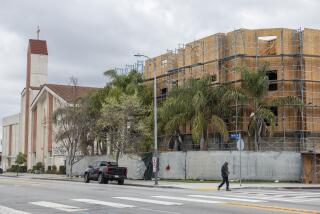S.F. proposal would restore fairness to rental market
The Times sure has plenty of sympathy for San Francisco landlords, arguing in a June 29 editorial that they should bear little -- if any -- responsibility for helping tenants in dire financial straits stay off the streets. In arguing against a proposal before the San Francisco County Board of Supervisors that would temporarily forbid landlords from increasing rent on tenants who have lost their jobs or had their wages reduced significantly, The Times says itŌĆÖs unfair to ŌĆ£turn private landlords into an unwilling agency of social welfare.ŌĆØ
But what about fairness for tenants? During the housing bubble, renters in San Francisco and elsewhere faced very difficult times as speculation dominated the real estate market. In San Francisco, the average rent tripled and the number of evictions -- mainly for condo conversions -- also tripled. Little attention was paid to the plight of tenants, and the media played a cheerleading role, treating soaring housing prices as good news and selling real estate as a canŌĆÖt-fail investment opportunity. Even as the real estate market turned downward across the country, home prices in San Francisco continued to climb.
It wasnŌĆÖt until late 2008 that the speculative bubble crashed in San Francisco, and soon tenants found themselves in even worse shape: The unemployment rate soared, surpassing 10% in May; many companies and government agencies began cutting back wages and hours; and senior and disabled tenants living on government benefits discovered they would not be getting a cost-of-living increase (they may even see those benefits reduced).
Thus, many tenants who saw their rents soar during the bubble suddenly found themselves in the position that they could no longer afford those rents. And the pop of the housing bubble didnŌĆÖt do too much to lower rents: In the first quarter of 2009, the real estate research firm DataQuick reported that San Francisco rents fell, but by a mere 0.01%. In other words, already sky-high rents merely stopped increasing, not providing much relief for tenants.
Landlords, though, found themselves in great shape despite the recession, having run up the rents to record levels. At the bubbleŌĆÖs peak, San Francisco landlords earned themselves the No. 1 spot on the list of most profitable rental markets in the country published by the research firm Marcus & Millichap. And these landlords did not need to be concerned about job losses or wage cuts, as their tenants remained obligated to pay their rent in full even if they had lost their jobs or had their incomes reduced.
Like homeowners, many San Francisco renters are in need of relief to stay in their homes, and huge rent increases during the housing bubble put many renters in the position of being unable to afford their housing when the recession hit. The relief package proposed by San Francisco Supervisor Chris Daly is a logical and innovative approach to helping renters who are in danger of losing their homes in an overpriced market. It does not roll back rents, which many tenants want (and what really should be done). It is a far more measured approach than described by The TimesŌĆÖ editorial: When tenants become unemployed or have wages cut significantly, and if they were already paying 33% of the rent, then the landlord must suspend any rent increases until the tenant has recovered financially.
While DalyŌĆÖs proposal tells owners to take it easy on people who have been hit by the recession, itŌĆÖs also fair to landlords: It requires that any hardship to the landlord should be considered before the rent increase is suspended. This law would not be permanent, but would sunset when San FranciscoŌĆÖs unemployment levels improve.
Landlords profited during the housing bubble by pushing rents to stratospheric levels, so itŌĆÖs fair to use rent control to level the playing field. The least they should be required to do now is to hold off on further rent increases for tenants in dire financial straits. Asking taxpayers in San Francisco to subsidize these excessive rents -- an approach favored by many landlords -- would amount to nothing less than bailing out landlords who profited from the housing bubble.
Ted Gullicksen is director of the San Francisco Tenants Union.
More to Read
A cure for the common opinion
Get thought-provoking perspectives with our weekly newsletter.
You may occasionally receive promotional content from the Los Angeles Times.










